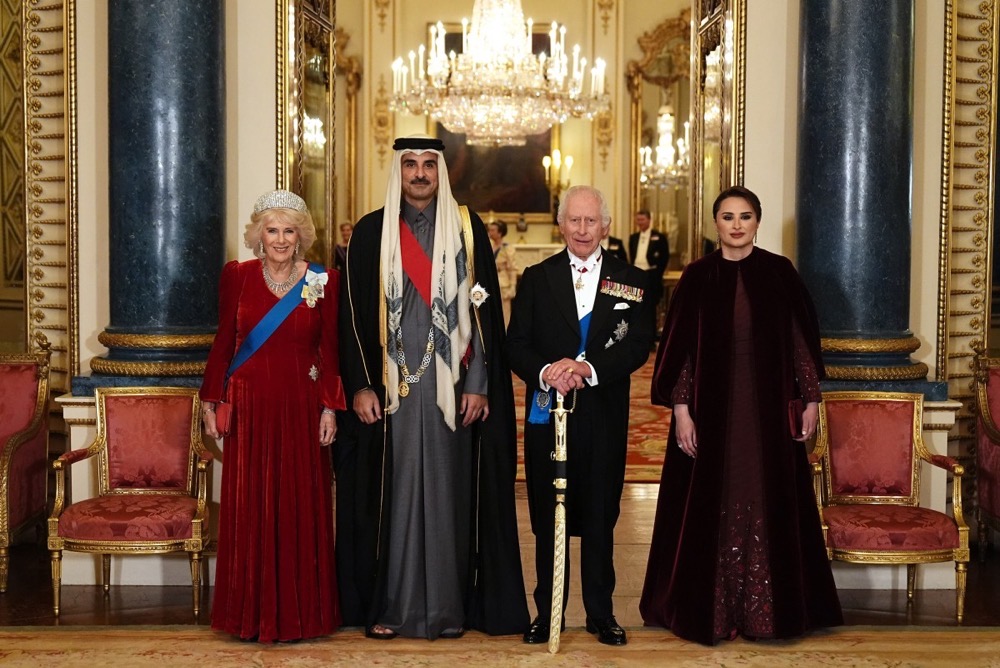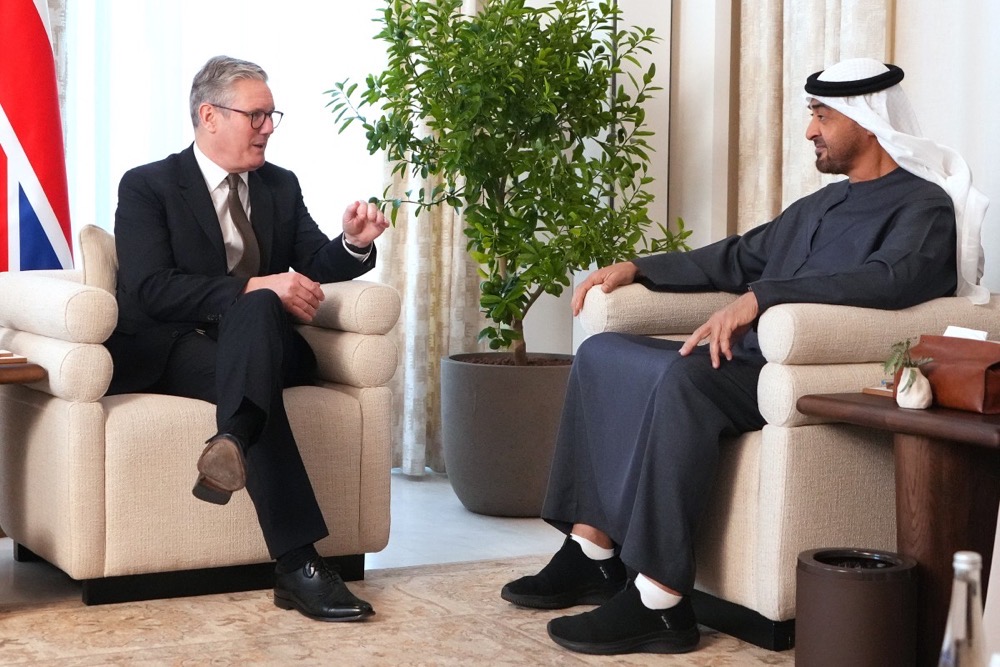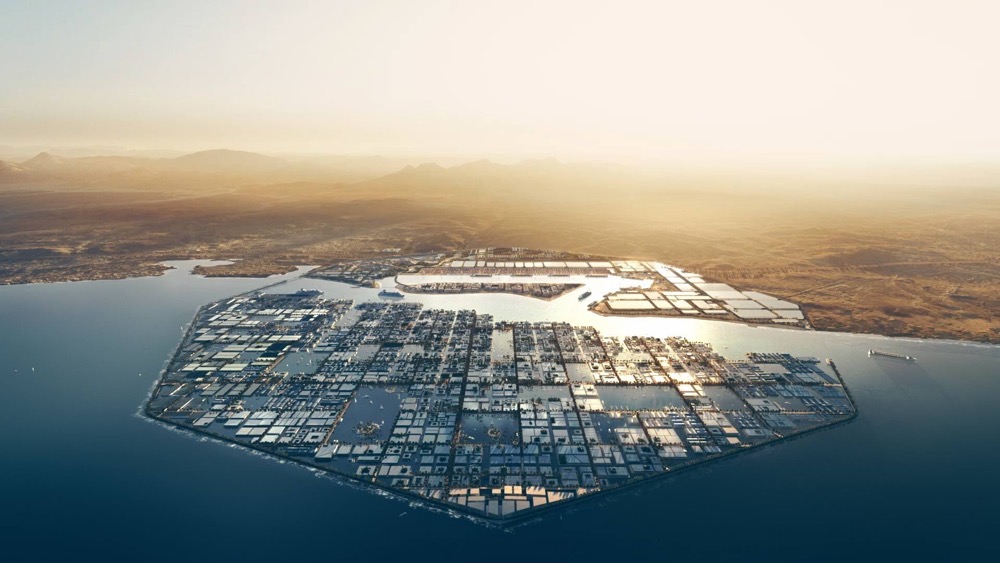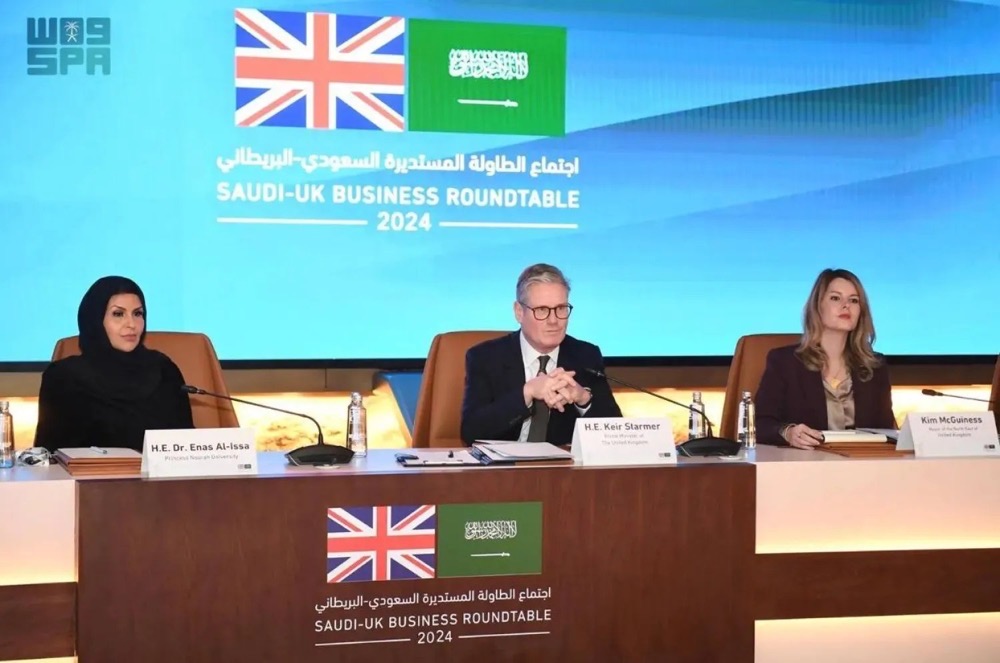DUBAI: Middle East countries continue to urge people to stay at home and follow social distancing rules as the global spread of coronavirus increases.
Saudi Arabia imposed a curfew, with violators facing up to 20 days jail and fines up to $2,665.
The United Arab Emirates closed public spaces, including malls, beaches, parks and restaurants. Meanwhile, delivery services will continue operating normally as they follow new safety practices.
Tuesday, March 24 (All times in GMT)
22:03 - US President Donald Trump said his administration’s decision to loosen restrictions related to the coronavirus and re-open the US economy would be based on facts and data but said the goal remained to do so by the Easter holiday in April.
Trump, speaking to reporters at the White House, said that for the most part he did not expect to have to use the Defense Production Act but would do so as needed.
20:35 - The Dow soared to its biggest one-day percentage gain since 1933, after US lawmakers said they were close to a deal for an economic rescue package in response to the coronavirus outbreak, injecting optimism following the biggest selloff since the financial crisis.
19:21 - 1,657 people have been arrested across Jordan since a curfew, aimed at stemming the spread of coronavirus, came into effect on Saturday had been placed in quarantine centers run by the army, a security official said.
The government has warned that people caught breaking the rules would be quarantined for 14 days and could also face up to one year of jail time.
The kingdom reported 26 new cases of the COVID-19 illness on Tuesday, bringing the total number to 153 confirmed infections in the country of around 10 million people.
18:51 - France becomes fifth country to report more than 1,000 deaths from #coronavirus, with official tally now at 1,100 deaths (vs 860) - public health official.
17:40 - President Donald Trump insisted Tuesday that he wants the coronavirus lockdown relaxed in the United States by mid-April, warning that keeping the measures in place could "destroy" the country.
"A lot of people agree with me. Our country -- it's not built to shut down," he said on Fox News. "You can destroy a country this way by closing it down. I would love to have the country opened up and just raring to go by Easter," Trump added. Easter is on April 12.
He also said he believed more people would die if the coronavirus restrictions were not lifted.

17:07 - Britain will open a new temporary hospital next week at the Excel exhibition center in London to treat as many as 4,000 people, health minister Matt Hancock said on Tuesday.
The UK is also looking for 250,000 volunteers to help the National Health Service (NHS) and vulnerable people hit by the coronavirus crisis, Hancock added.
17:05 - Officials in Italy announced on Tuesday that the death toll from the virus in the country had risen by 743 to 6,820. Its number of cases now stands at 69,176.
16:30 - Canada reports 2,187 coronavirus cases and 25 deaths as of Tuesday, the government said.
16:30 - Tunisian police arrested more than 400 people for breaking a night-time curfew imposed to fight the spread of coronavirus, the authorities said Monday.
Around 30 of the 408 transgressors who were arrested remained in custody, while the others were released after a warning, Interior Minister Hichem Mechichi told reporters.
15:15 - India to go under total lockdown as of Tuesday evening for 21 days, PM Narendra Modi said in a television address. It means more than 2.6 billion people worldwide are being urged to observe a lockdown.
15:00 - Climate activist Greta Thunberg, who claims she "likely" had and recovered from the coronavirus, said on Tuesday the swift and far-ranging economic and social shifts being brought in to stem the coronavirus pandemic showed that the rapid action needed to curb climate change was also possible.

14:15 - WATCH: This from today in Amioun Koura in northern Lebanon, where the Lebanese Army were calling on people to stay at home as part of the country's coronavirus preventative measures.
13:35 - Amazon's India unit on Tuesday said it will temporarily stop taking orders for non-essential products and disable their deliveries in a bid to fulfil critical needs of its customers at a time much of the country is under lockdown to prevent the spread of the coronavirus pandemic.

13:20 - The UN Syria envoy Geir Pedersen appeals for a complete and immediate nationwide cease-fire throughout Syria to enable an all-out effort to combat the virus.
13:15 – Iraq said that coronavirus cases have risen to 316.
12:55 – Global airlines urged governments on Tuesday to speed up bailouts to rescue the air transport industry as they doubled their estimate of 2020 revenue losses from the coronavirus crisis to more than $250 billion. “We clearly need massive action very quickly and urgently,” Alexandre de Juniac, director general of the International Air Transport Association, told reporters on a conference call.
12:40 – The Saudi Ministry of Health has reported 205 new cases of coronavirus, bringing the total to 767, with the Kingdom reporting its first death yesterday.
12:35 – Egyptian president Abdel Fattah El-Sisi has called on citizens to fully comply with government measures to confront coronavirus, adding the decisions adopted by the Egyptian government were urgent to prevent spread of the virus.
12:30 – Oman has suspended all internal and international flights as of March 29, except cargo operations and Musandam flights, state TV reported.
Advisory: A number of our flights have been rescheduled or cancelled. For the foreseeable future, there will be ongoing changes to our flights. Please visit https://t.co/aUSKlj3wiC to check your flight’s status within 48 hours prior to departure. Thank you for your understanding. pic.twitter.com/Y0FlpilUIl
— Oman Air (@omanair) March 24, 2020
12:20 – Sudan has recorded the third case of coronavirus infection.
12:15 – Egypt has extended the suspension of air traffic for another two weeks, starting from April 1.
12:15 – Japanese Prime Minister Shinzo Abe confirmed on Tuesday that the Tokyo 2020 Olympics would be postponed to 2021 due to coronavirus pandemic, despite holidng out and saying the event would go ahead just a few days before. READ THE STORY
12:10 – Tunisia has recorded 25 new coronavirus cases, bringing the total to 114.
12:00 – Kuwait is imposing mandatory quarantine on nationals returning from abroad for a period of 14 days.
11:55 – Bahrain has reported the death of a 65-year-old citizen due to coronavirus, bringing the death toll to four.
11:55 – Gaza is closing all mosques from tomorrow morning for two weeks.
11:50 – Saudi banking firm Samba said only 40 percent of Samba Group employees currently work from the offices.
11:40 – The number of confirmed cases in Switzerland of infections with the new coronavirus has risen to 8,836 people by midday on Tuesday from the 8,060 reported on Monday, the Federal Office of Public Health said. The number of deaths rose to 86 from 66.
11:30 – Egypt has declared curfew from 7p.m. to 6a.m. for two weeks starting Wednesday to counter the spread of coronavirus. Transportation will stop from 7p.m. to 6a.m. starting tomorrow, while all commercial stores will close from 5p.m. until 6a.m., the Egyptian prime minister said, and there would be a complete closure of commercial premises on Saturdays and Fridays. READ THE STORY
10:45 – Another 514 people have died in Spain over the past 24 hours, raising the death toll to 2,696, as the number of infections surged towards 40,000, the government said Tuesday.
The number of people who have tested positive rose by nearly 20 percent to 39,673, the health ministry said, while the death toll represented an increase of 23.5 percent over the figures from Monday.
10:30 – The number of cases of coronavirus in Italy is probably 10 times higher than the official tally of almost 64,000, the head of the agency that is collating the data said on Tuesday. Latest figures show 6,077 people have died from the infection in barely a month, making Italy the worst-affected country in the world, with close to double the number of fatalities in China, where the virus emerged last year.
10:30 – A World Health Organisation spokeswoman said she was seeing “very large acceleration” in coronavirus case numbers in the US, says it has potential to be center of outbreak.
09:55 – UAE’s Abu Dhabi and Dubai airports are suspending all passenger flights as of 11:59p.m. local time on March 26 for two weeks with the exception of evacuation flights.
In accordance with the directive from @NCEMAUAE and the @gcaauae, all passenger flights to and from the UAE - including inbound, outbound and transit - will be suspended for two weeks, as precautionary measures to limit the spread of COVID-19. https://t.co/ppqwasKhLk 1/4 pic.twitter.com/H5N7iRZIgl
— Dubai International (@DXB) March 23, 2020
09:45 – Iran’s health ministry official said 122 died in past 24 hours, bringing the number of deaths to 1,934, and 24,811 have been infected with coronavirus.
09:40 – A Lebanese man who was taxi pooling burned his car on Tuesday morning at the Sports City area in Beirut to protest security forces’ strict enforcement of new transport regulations put in place to control the spread of coronavirus. The driver, who was earlier fined for violating the 1-passenger-per-taxi limit, sustained burns and was transported to the hospital.

A taxi driver burned his car to protest Lebanon’s strict implementation of coronavirus-related travel restrictions. (Supplied)
09:10 – The Philippine health ministry reported 90 new coronavirus cases, bringing the total to 552 and two new deaths, raising the number to 35.
09:05 – Restaurants in Vietnam’s business hub, Ho Chi Minh City, must close until March 31 to help curb the spread of the coronavirus, the city’s ruling body said on Tuesday.
08:50 – Al Arabiya TV news channel has quoted unnamed sources suggesting Egypt could be about to impose curfew and further social restrictions in an attempt to control the spread of the coronavirus.
08:05 – Kuwait’s Health Ministry recorded two new coronavirus cases in the past 24 hours and nine recoveries, bring the total of recoveries to 39.

Kuwaiti health ministry workers scan employees and visitors of the ministries complex on March 4, 2020. (AFP)
07:55 – The number of people in Israel infected with the coronavirus has increased to 1,656, of whom 31 are in serious condition, Sky News Arabia reported, quoting the country’s Ministry of Health.
07:30 – The executive vice president of Eni for the Middle East has confirmed that the energy company was reviewing all energy projects in the region due to market conditions, Al Arabiya reported.
07:15 – Thailand’s prime minister said his government was declaring a state of emergency to control the coronavirus outbreak. Thailand’s cabinet on Tuesday also approved additional stimulus measures worth 107 billion baht ($3.25 billion) in a bid to mitigate the impact of the coronavirus outbreak. READ THE STORY
06:55 – Iranian president Hassan Rouhani said 1.2 million government employees out of a total of 2.5 million were not going to work as part of measures to contain the coronavirus outbreak.
06:35 – Bahrain’s finance minister Sheikh Salman bin Khalifa Al-Khalifa said that the government will implement a 4.3 billion dinars ($11.41 billion) package as soon as possible at the highest priority, Bahrain state TV reported. READ OUR REPORT
05:55 – Oman Ministry of Health registered 18 new cases of coronavirus, bringinf total cases to 84, according to Sky News Arabia.
05:35 – The number of confirmed coronavirus cases in Germany has risen to 27,436, deaths to 114, Robert Koch Institute monitoring shows.

Public order officers walk through an deserted pedestrian zone in Cologne, western Germany, on March 23, 2020. (AFP)
05:10 – China’s central Hubei province, where the deadly coronavirus first emerged late last year, is to lift travel curbs after two months under lockdown, local officials said Tuesday.
Healthy residents will be allowed to leave the province from midnight Tuesday, while Wuhan, the initial origin of the outbreak, will lift restrictions from April 8.
05:05 – The Philippine economy could contract this year as a consequence of the coronavirus outbreak, the economic planning agency said in a report made public on Tuesday.
Growth this year could be between -0.6 percent to +4.3 percent without mitigating measures, the agency said, adding the estimates assumed that the adverse impact of the fast-spreading virus will be felt until June.
04:25 – Police in India’s capital broke up the longest-running protest against Prime Minister Narendra Modi’s citizenship law on Tuesday, citing a ban on public gatherings because of the coronavirus outbreak.
Dozens of people, many of them women, have been staging a sit-in protest since early December on a street in the Shaheen Bagh neighbourhood, which has become a focal point for opposition to the law seen as discriminating against Muslims. READ THE STORY
04:20 – Italy reported a second successive drop in daily deaths and infections from a coronavirus that has nevertheless claimed more than 6,000 lives in a month. The Mediterranean country has now seen its daily fatalities come down from a world record 793 on Saturday to 651 on Sunday and 601 on Monday. The number of new declared infections fell from 6,557 on Saturday to 4,789 on Monday.
03:20 – Thailand has recorded 106 new cases of coronavirus and three more deaths, a health official said on Tuesday. The country now has 827 cases and 4 fatalities since the outbreak began.
02:30 – Macau will ban all mainland Chinese, Hong Kong and Taiwan residents who have travelled overseas from entering the city from Wednesday.
Opinion
This section contains relevant reference points, placed in (Opinion field)
02:20 – Australia’s most populous state recorded its highest daily rise in coronavirus cases on Tuesday and officials warned of harsher penalties for anybody violating self-isolation orders as the country stepped closer to a full lockdown.
New South Wales state identified 149 new coronavirus cases overnight, bringing the state total to 818, and the national toll to 1,886 cases. The national death toll remained unchanged at seven.
Australia has registered significantly lower rates of the virus compared to elsewhere in the world, but the infection rate has quickened in recent days.
02:15 – The Philippine health ministry confirmed 39 new cases of the coronavirus, bringing the country’s total to 501.

A volunteer disinfects a vehicle in Manila on March 20, 2020, after the government imposed an enhanced community quarantine against the rising coronavirus infections. (AFP)
01:50 – The Chinese government said that all overseas arrivals would be subject to centralized quarantine and nucleic acid test from March 25, official media reported.
01:35 – US Olympic organisers joined calls for the Tokyo 2020 Summer Games to be postponed due to the coronavirus pandemic, while the International Olympic Committee, according to member Dick Pound, has decided to delay the event, likely for a year.
01:20 – South Korea reported 76 new coronavirus cases on Tuesday, taking its total infections to 9,037, the Yonhap news agency said, citing health authorities.
Monday, March 23 (All times in GMT)
22:20 – Mexico had 367 confirmed cases of coronavirus in the country on Monday, up from 316 the day before, deputy health secretary Hugo Lopez-Gatell said, with a total of four deaths.
Previously the country had reported two deaths.
21:10 – Yemen’s universities and schools will be suspended from March 23 until May 30 to curb the spread of coronavirus, Yemen’s Prime Minister Maeen Abdulmalik Saeed said.
19:50 – Jordan confirmed 15 new coronavirus cases, bringing the country’s total to 127.
19:25 – Morocco has seen an increase in cases to 143.
































